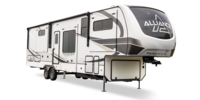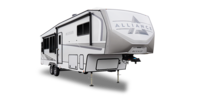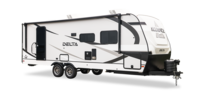Everything You Need to Know About Boondocking 2020
What is boondocking? Maybe you’ve heard of boondocking from other campers or RV friends, but you aren’t sure what exactly it is. Boondocking is camping somewhere that is not an official campground.
If you are interested in boondocking in your RV, this is your beginner's guide for 2020. Find out everything you need to know about boondocking, including resources to help you find the best places to boondock. And, learn how to keep yourself safe and legal while off the grid and exploring the great outdoors in your RV.
What is Boondocking? The Beginners Guide to Boondocking in 2020
Boondocking is a fast-growing craze amongst RVers, worldwide. The delineative factor that separates traditional RV camping from boondocking is the accessibility to power and water hookups. Traditional RV campsites include power and water hookups for your rig, whereas boondocking campsites do not.
Another name for boondocking is dry camping. It might sound difficult to camp without water and power hookups. And, it is – if you don’t know what you're doing.
But, with the right information, equipment, and knowledge, boondocking can be your ticket to a brand-new kind of wilderness experience. After all, the most scenic and tranquil spots on earth are in the wilderness, instead of at a campsite. And, the best part is that boondocking is, for the most part, a free activity.
Boondocking offers different benefits to different people, depending on the type of RV rig you have. But, no matter what you get out of it, boondocking is about freedom and exploration.
The Essential Parts of Boondocking: How and Where You Camp
When you go boondocking, it is just you, your rig, and the wild. Some boondockers take a decidedly simplistic approach, choosing a small rig and minimal luxuries. Others approach boondocking as the ultimate luxury-on-wheels.
Typically, boondocking involves making do without a developed campsite, electricity hookups, or water hookups. But, that doesn't mean that boondockers are out in the woods ‘roughin’ it. Often, boondockers invest in upgrading their rig to provide alternative sources of energy, like an electrical generator or solar panels.
Types of Locations for Boondocking
The first rule of boondocking is “leave no trace.” This means, leave nature as close to its original state as possible. So, whether you’re boondocking in a National Park or on someone's private property, always leave it as you found it.
That being said, there are several types of locations that provide RV friendly conditions for boondocking. The first type is a dispersed camping location, which is publicly owned land that makes camping available. Dispersed camping sites are bare-bones, other than a durable surface on which to park your RV.
You won’t find any electrical hookups, water hookups, or dumping sites at many of the locations. But, you will experience nature like never before, on some of the most scenic sites in the country. The Bureau of Land Management, National Forest Service, and Department of Fish and Wildlife offers boondocking RV sites on many of the lands that the organizations manage throughout the country.
In recent years, dispersed camping sites have seen an increase in popularity. To clamp-down on bad-actors, some sites are deemed as “designated dispersed camping sites.” The only difference with these sites is that the service that manages the park sets an occupancy limit and designates numbers or letters to the individual campsites.
Is it Legal and Safe to Boondock in Your RV?
Yes! There is a common misconception that parking your RV on public land is illegal. Despite the ordinances that specific towns or cities have against parking your RV, there is nothing illegal about Boondocking.
This is especially true when boondocking on public lands that are owned or operated by a Federal Department, such as the Bureau of Land Management, National Forest Service, or Department of Fish and Wildlife. The other way to legally boondock with your RV is to check out the many of the individual and privately owned free campsites across the United States.
Most of the time, boondocking takes place in seclusion from other people, or in relative seclusion. So, as long as you’re sticking to tried-and-true dispersed camping sites, you don’t have much to worry about in the way of criminal activity. Most of the people out there boondocking are adventure seekers and nature lovers, like you.
When it comes to hazards presented by nature, that is a different story. When you are seeking out the undeveloped and raw wilderness – such as boondockers do – you might come across any number of things, like bears. Whether or not you are ready to deal with bears is up to you, but as long as you are confident in your camping abilities, you have nothing to worry about.
At the end of the day, What is boondocking? If you would rather be out in the middle of nature with no other living soul for miles, then paying per night at a developed campground, you might be a boondocker. Talk to an RV specialist to find out how to take your rig off the grid.









